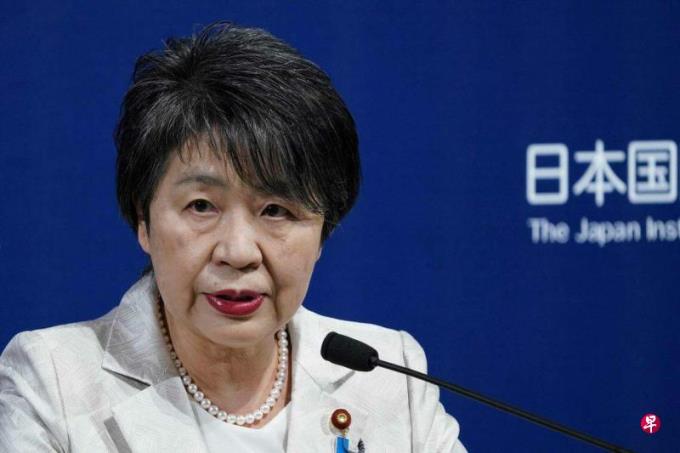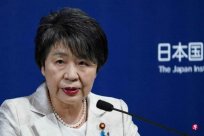
Japan's newly released diplomatic blue book, five years apart again proposed to promote the "mutual benefit relationship between Japan and China."Japanese analysts pointed out that the official concerns of China's increasingly expanding economic scale and military strength, but maintaining the stability of Japan -China relations, and avoiding diplomatic considerations to avoid conflicts.
Japanese Foreign Minister Uenagawa Yoshiko on Tuesday (April 16) presents the 2024 Japanese diplomatic blue book at the cabinet conference.Major media in Japan followed in the Blue Book, and once again mentioned that it is necessary to promote the "strategic mutual benefit relationship" with China.
It is reported that the term "strategic mutual reciprocity relationship" was proposed by then Prime Minister Shinzo Abe in 2006, at the time, the purpose was to reorganize Sino -Japanese relations.In 2019, Abe intends to invite Chinese officials to visit Japan. That year's diplomatic blue book also emphasized "strategic mutual reciprocity relationships."This time, five years apart, it is considered to continue to maintain this relationship to continue to maintain this relationship without deepening contradictions.
This year's diplomatic blue book pointed out that there are many problems between Japan and China. Worrying about the enhancement of Chinese military strength is a serious concern of Japan and the international community, and it is also the biggest strategic challenge to date. However, through the efforts of both parties,'Constructive and stable Japanese -China relations' is very important. "
The Blue Book emphasizes that in addition to comprehensively promoting the "mutually beneficial relationship of common strategic interests, Japan and China have a significant responsibility for the peace and prosperity of regions and the world."
Japanese Prime Minister Kishida and Chinese officials also reiterated strategic reciprocal relationships at the summit talks during the Asia -Pacific Economic Cooperation Organization (APEC) Summit last November last November.
The analysis of Nikkei News quoted the analysis of the Chinese Political Science Professor of China University of Japan, and pointed out that "strategy contains competitive relationships. In terms of relations with China, Japan (official) is trying to balance the way of dealing with China and seeking dialogue.And cooperate within the scope of force. "
Blue Book summarizes the changes in the international situation and Japanese foreign policy over the past year.In the international situation, with the deterioration of Russia's invasion of Ukraine and Pakistani, the structure of conflict will be more complicated.
The article states that the Seven Kingdoms Group (G7), the US -Japan -India -Australian Safety Dialogue (QUAD), as well as like -minded transnational frameworks such as Japan, the United States, and South Korea have become relatively important.The "Japan -Mei Fei" framework, which was just held on the 11th of this month, was also written into the Blue Book, stating that "further strengthening cooperation and promoting the specific implementation of cooperation."
The Blue Book focuses on China's military, saying "this includes unilateral changes to the current situation of the East China Sea and the South China Sea; the situation of the islands of Jiange (known as the Diaoyu Islands), the increase in military activities around Japan, and cooperation with Russia."
Japan positions South Korea as a partner South Korea to strongly protest "Takeshima is Japanese territory"
In terms ofJapan and South Korea relations, the Blue Book described 2023 is a year when Japan and South Korea relations have changed significantly, and the heads of the two countries have held many meetings.The Blue Book positions South Korea as "an important neighboring country and should be used as a partner to solve various problems in the international community."The word "partner" for South Korea was 14 years ago.
On the issue of North Korea, it was referred to as the "timeliness humanitarian issue" that kidnapped the Japanese last year, and this year was strengthened to "humanitarian issues that cannot be released at a moment."
South Korea's strong protest against the Blue Book once again proposed that "Takeshima (South Korea is called Dojima) as the Japanese territory", which requires the Japanese side to withdraw.The Ministry of Foreign Affairs of Korea summoned the Japanese Embassy in South Korea to summarize the Minister Shisheng Tyoshima to express protests.
In Beijing, a spokesman for the Chinese Ministry of Foreign Affairs, Lin Jian, said at a regular press conference that the Japanese party's relevant documents followed the discreditation of Chinese words, rendering the so -called Chinese threats, unreasonable interference in China's internal affairs, and China resolutely opposed it.
He urged the Japanese side to position the strategic mutual benefit relationship as the development of bilateral relations, and make unremitting efforts to build the goal of constructing the constructive and stable Sino -Japanese relations that meets the requirements of the new era.




